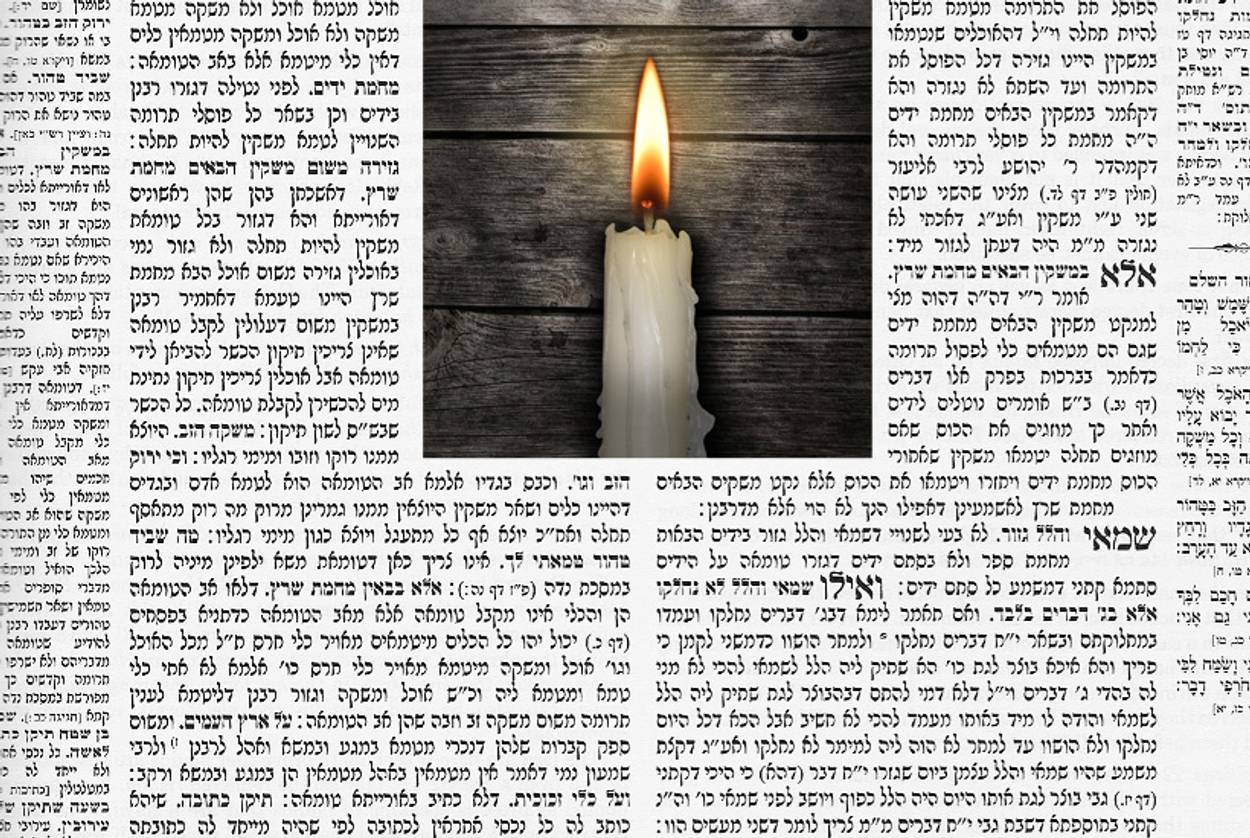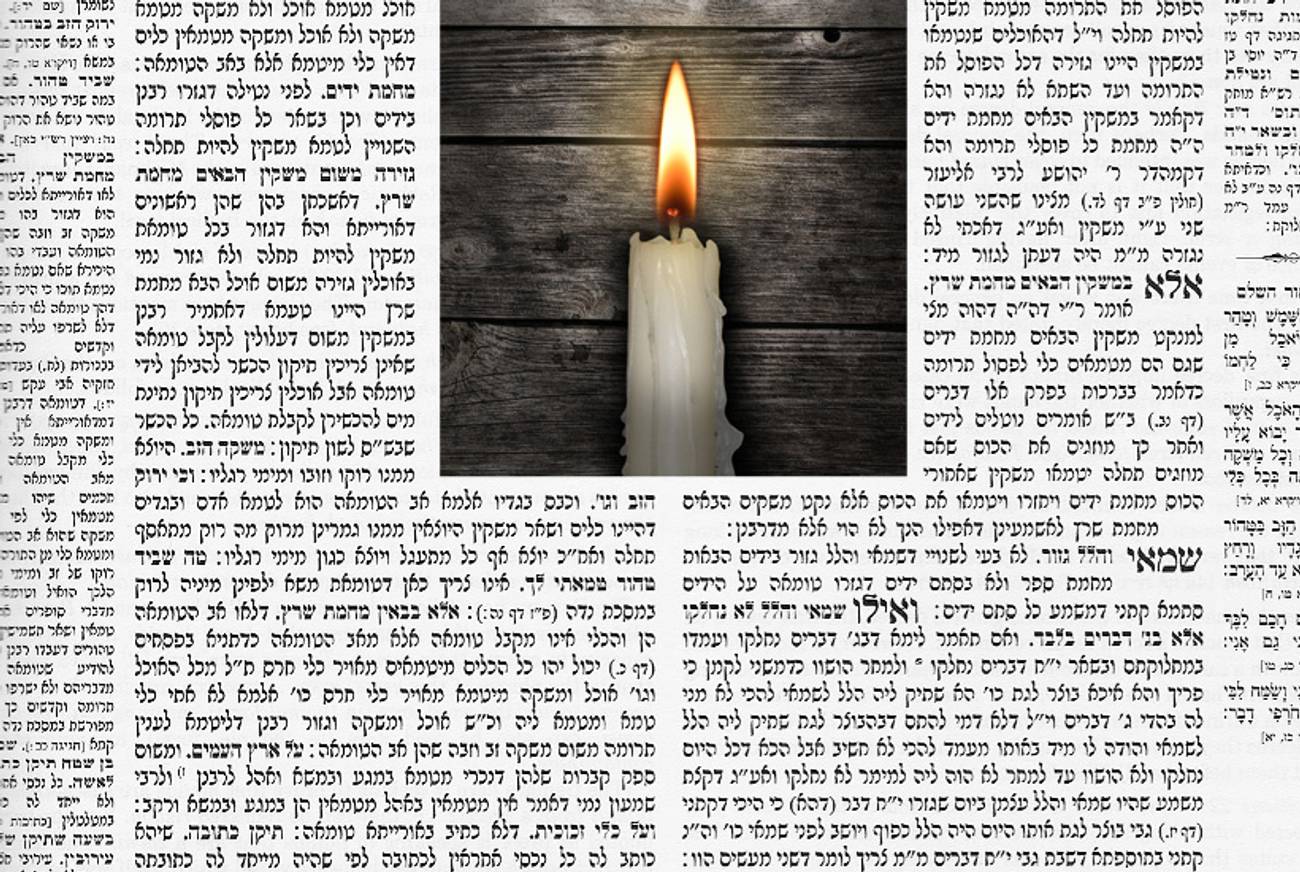The Talmud’s Abstractions Live in Concrete Examples About Candles and Weasels
Daf Yomi: In textual analysis, the rabbis found biblical bases for customs and rituals that lacked them




Literary critic Adam Kirsch is reading a page of Talmud a day, along with Jews around the world.
After several months of reading Tractate Eruvin, with its abstract geometries and arcane regulations, I was more than ready to jump into the next tractate in the Daf Yomi cycle, Pesachim. Passover, after all, is a holiday familiar to just about any Jew who is even slightly observant, and it is full of practices and rituals that require explanations. The first mishnah in Pesachim concerns one of those practices: the search for chametz, or leaven, on the night before Passover begins. The wording of the law seems straightforward enough: “The night of the 14th [of Nissan] we search for the chametz by the light of a candle. Any place into which chametz is not usually brought does not require searching.” Yet those two sentences are enough to sustain an exceptionally rich, eight-page-long discussion in the Gemara, whose subjects range from the importance of refined speech to the dietary habits of weasels.
The rabbis start out by seizing on a single word in the mishnah and turning it round and round. We search for chametz, the text says, on the or of the fourteenth. But how do we know that or in this context means “night,” given that, on many occasions in the Bible, it seems to be better translated as “light”? The rabbis cite a number of biblical verses in defense of each possible translation, including the most famous, from the beginning of Genesis: “God called the light [or] day.” The arguments in favor of translating or as day are so strong, in fact, that it seems surprising when the Gemara finally agrees to translate it as night instead. The clincher is a baraita—a legal ruling not collected in the Mishnah—attributed to Shmuel, which substitutes the word “leilei” for “or.” Since Shmuel’s word unambiguously means “night,” it’s fair to conclude that the mishnah meant the same thing.
This long debate, which consumes most of the first daf of Pesachim, raises an obvious question. Why did the mishnah use the word or in the first place, if its meaning was so ambiguous? The reason, we learn, is that or is a more refined expression than leilei, and refined speech is always to be preferred: “A person should never emit a coarse expression from his mouth,” says Rabbi Yehoshua ben Levi. We then hear examples of how far some rabbis took this principle. Rav once had two students who were tired out from studying; one complained that he was tired as a pig, the other that he was tired as a goat. “And Rav did not speak with that first one,” the Gemara says. Mentioning a pig, a non-kosher animal, was taken to be a breach of etiquette. In another case, a priest who mentioned a lizard—another impure animal—was disqualified from the priesthood.
Refinement in speech is not just about avoiding the wrong vocabulary, however. It’s also a matter of delicacy and empathy. On one occasion, Yochanan Chakukaah went out to the countryside to inspect the crops. When he returned to his village, he was asked, “Did the wheat turn out well?” Rather than disappoint people with the news that the wheat was doing badly, he simply changed the subject: “The barley turned out well,” he answered. Bad news, we learn from the Talmud, should be broken gently, with consideration for the sufferer.
Next the Gemara turns to some technical questions regarding the legal status of chametz. When a tenant rents a house from a landlord, who is responsible for getting rid of the chametz? If a tenant begins a lease on the 14th of Nissan—the day that the search for chametz is supposed to take place—can he assume that his landlord has already performed it, or does he need to look for himself? The Gemara first offers a pragmatic, almost impatient-sounding answer: “Ask!” That is, why doesn’t the tenant simply ask the landlord if he has searched for chametz? But we are dealing, the response comes, with a case where the landlord “is not here to ask.” In such a case, the Gemara concludes, we assume that the landlord has cleansed the house, because of the principle “that all are chaverim regarding the search for chametz.”
The term chaverim—literally, “friends”—opens a very interesting window on the world of Talmudic observance. There were, the Schottenstein Edition’s notes explain, two categories of Jews in Talmudic times. Chaverim were those who undertook to obey even the most intricate laws regarding purity and tithing. The ordinary Jew, the am haaretz, was not considered capable of understanding these details, since he hadn’t been well educated in Torah. Now, even an am haaretz in Talmudic times would have been, by necessity, fairly observant—on Shabbat, for instance, the whole Jewish community would have closed for business, even those who didn’t know exactly how to calculate an eruv techumin. Cleansing chametz, apparently, was one of those duties that even an am haaretz could be counted on to do correctly. But it is interesting to consider that the high-level legal arguments we read in the Talmud were never expected to apply to all, or even most, Jews.
The search for chametz, we learned in the mishnah, is supposed to be conducted by candlelight. This detail is never explicitly stated in the relevant passages of Exodus, where God commands the Israelites to remove chametz from their houses. How, then, do we know that we are supposed to search with a candle, rather than with a torch, or even by daylight? The rabbis, characteristically, give two kinds of answer, practical and textual. Sunlight, we learn, can be used in areas where it shines brightly—for instance, under a skylight. It is only in the sides and corners of a room, where the skylight doesn’t reach, that a candle must be used. And why a candle instead of a torch? Because, the rabbis answer, a candle is less dangerous, gives a steadier light, and can be used to illuminate small holes, as a torch cannot.
But we can also follow a textual route to the same conclusion, as Rav Chisda shows on Pesachim 7b. Exodus 12:19 states, “For a seven-day period leaven shall not be found in your homes.” Using the Talmudic technique that allows us to link different Bible verses if they use the same words, Rav Chisda follows this clue to Genesis 44:12, which reads, “He searched … and it was found.” “Searched,” in turn, leads us to Zephaniah 1:12: “At that time I will search Jerusalem with candles.” In this way, we learn that finding involves searching, and searching requires candles. To reason this way seems very foreign to the modern reader, but as a solution to the rabbis’ problem, it is quite ingenious: It provides a biblical basis for a custom that apparently lacked one. It also demonstrates how deeply familiar the rabbis were with the text of the Bible. Google couldn’t do a better job of linking words and verses.
Finally: those weasels. On Pesachim 9a, a mishnah tells us, “We are not concerned that a weasel may have dragged chametz from house to house or from place to place.” That is, once a place is searched for chametz, we don’t have to search it again for fear that an animal might have dragged chametz into it. If we did, the law continues, “there would be no end to the matter”: We would become obsessive-compulsives, constantly rechecking the same places.
That is all well and good, the Gemara agrees, if no one has actually seen a weasel carry chametz into a house. If no one sees it, we can assume it didn’t happen. But what if you actually do see a weasel carry chametz into your house? Do you have to search it again, or can you assume that, a weasel being what it is, it probably ate the chametz itself and so disposed of the problem?
Here the discussion takes a macabre turn. To resolve the question about Passover, the rabbis invoke the law on another subject—the ritual purity status of non-Jewish homes. All non-Jewish homes were off-limits for priests, we learn, because Gentiles in Talmudic times had the habit (or the rabbis believed they had the habit) of burying their stillborn children in their houses. This gave the house the status of a graveyard, which a Kohen is forbidden to enter, unless it was searched and found to be free of corpses.
There is, however, an exception to this rule: “Any place that a weasel or a pig are able to go does not require a search.” That is because we can assume that, if there had been a corpse present, it would have been eaten up by the carnivorous animal. The rabbis now ask whether this rule can be applied to the question of chametz. If a weasel would eat a dead baby, can we assume it would also eat bread? And remember, the Gemara says, that there is only a possibility there was a corpse in the Gentile’s house, whereas we are certain a weasel has brought chametz into the Jew’s house. How does that change our calculation?
Finally, the rabbis seem to settle on an answer. Even if we can’t be sure that the weasel has eaten the chametz, we can assume that it has at least dragged it away to its burrow for safekeeping and so removed it from the house that way. As often happens in the Talmud, a question about something abstract—probability and certainty—is posed in an extremely concrete fashion, as a problem involving animals and corpses. This combination, I find, is what makes reading the Talmud a continual surprise.
***
Like this article? Sign up for our Daily Digest to get Tablet Magazine’s new content in your inbox each morning.
Adam Kirsch is a poet and literary critic, whose books include The People and the Books: 18 Classics of Jewish Literature.
Adam Kirsch is a poet and literary critic, whose books include The People and the Books: 18 Classics of Jewish Literature.